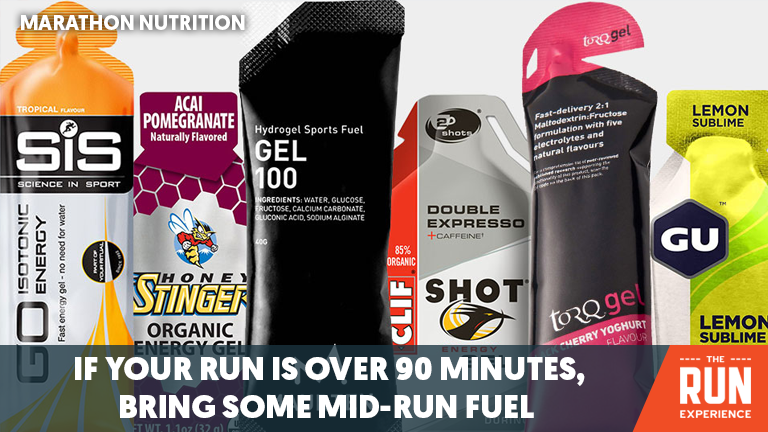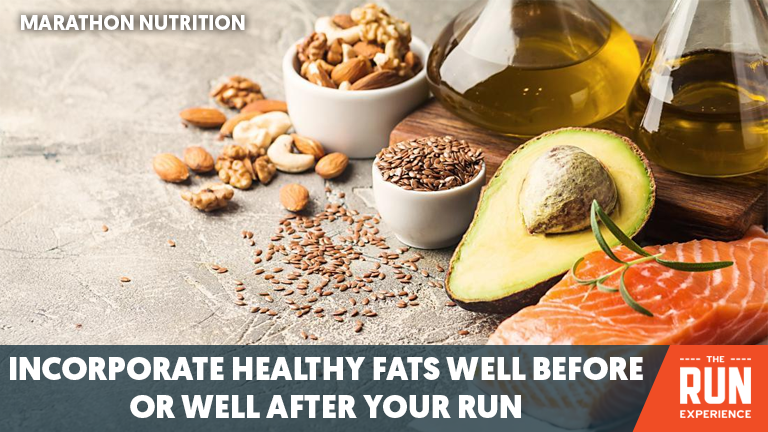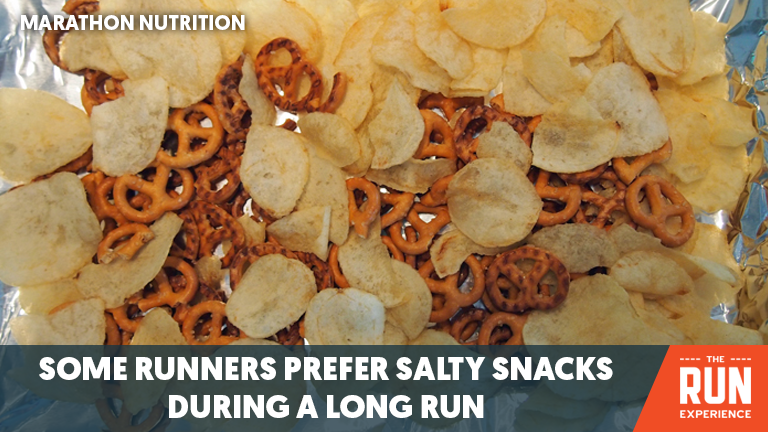How to Perfect Your Marathon Training Diet Plan
The million-dollar question: how do I perfect my marathon training diet? In this article, we're breaking it down and keeping things simple.

The million-dollar question: how do I perfect my marathon training diet plan?
Running a marathon isn't just about logging miles — it's about fueling your body for success. Whether you're a first-timer or a seasoned pro, nailing your marathon training nutrition can make or break your race day experience.
So, what's the secret sauce to a killer marathon training meal plan? Don't worry — we're not going to overwhelm you with complicated diet rules. Instead, we're breaking down the essentials of marathon nutrition in a way that's easy to digest (pun intended).
We’ll break down what to eat when training for a marathon, how to practice race-day nutrition, and everything in between. In this guide, we'll walk you through:
- Creating a sustainable marathon diet plan: Fuel your training without feeling deprived
- Perfecting your marathon training nutrition: Learn what to eat before, during, and after those long runs
- Developing a race day strategy: Practice makes perfect when it comes to marathon nutrition plans
What Is a Marathon Training Diet?
Training for a marathon typically involves running four to five days a week, including a weekly long run, which gradually increases in distance as the race approaches. The intense training demands a thoughtful diet that fuels recovery and performance.
Here are the basic components of a marathon training diet plan:
1. Carbohydrates
- Purpose: Primary energy source for high-intensity endurance activities.
- Sources: Whole grains, fruits, vegetables, and legumes.
- Note: Runners often increase their carbohydrate intake in the days leading up to the race, a process known as "carb-loading," to maximize glycogen stores.
2. Proteins
- Purpose: Repair and recovery of muscles.
- Sources: Lean meats, poultry, fish, eggs, dairy products, legumes, and nuts.
- Note: Adequate protein is essential to repair muscles after long runs and hard workouts.
3. Fats
- Purpose: An energy source for lower-intensity activities and overall health.
- Sources: Avocados, nuts, seeds, olives, and fatty fish.
- Note: Maintaining a moderate intake of healthy fats is vital for overall health and sustained energy.
4. Hydration
- Purpose: Maintain fluid balance and prevent dehydration.
- Sources: Water, electrolyte drinks, and natural juices.
- Note: Hydration is crucial, especially during long runs, to prevent cramps, overheating, and other heat-related issues.
5. Vitamins and Minerals
- Purpose: Ensure the body functions optimally and boosts immunity.
- Sources: A variety of colorful fruits and vegetables, whole grains, and lean proteins.
- Note: Particular attention might be given to calcium for bone health and iron to prevent anemia, especially in female athletes.
6. Timing
- Pre-Run: Focus on easily digestible carbs and a small amount of protein.
- During the Run: Focus on easily digestible sources of carbohydrates, like energy gels or chews.
- Post-Run: Prioritize carbohydrates to replenish glycogen stores and protein to aid muscle recovery.
How to Create a Marathon Training Diet Plan
For your marathon training nutrition, your diet should follow a few baseline fueling rules. However, most of the specifics will depend on what time of day you train, and how your training plan breaks up the mileage.
Basic Marathon Training Nutrition Rules

1. Avoid complex carbs before a run
Complex carbs, such as sweet potatoes, brown rice, and quinoa, require your body to do a lot of work in order to digest them. And because a training run requires the same of your body, stick to simpler carbs before the run.
2. Don’t fuel if you don’t need to
If your run is 60 minutes or less, you typically don’t need to incorporate any excess fuel. Your normal daily diet should be enough to fuel you through 60 minutes or less.
If your run is between 60-90 minutes, you will want to take in some simple carbs or another quick energy source before you run.
If your run is longer than 90 minutes, you’ll want to bring some mid-run fuel with you. Because your marathon falls in this category, we will address this more in detail below. But as a general rule, bring some energy gels (or whatever your preferred mid-run snack is) on any run longer than 90 minutes.
3. Be mindful of sports drinks
While most of them are great in helping replenish electrolytes, many are extremely high in sugar. This impedes your muscle recovery and will prolong soreness unnecessarily—especially when it’s part of your diet for marathon training.
To fix this, find low-sugar sports drinks, or just dilute the ones you have by mixing them with water.
4. Keep your running goals and your food goals in mind
So, while a marathon requires intentional fuel to support long training hours, your food goals may further specify what you need.
If you are training for weight loss, consider talking to a dietitian or a nutritionist to design a meal plan that will sustain you, but will also further your body weight goals.
So, take the advice below with a grain of salt, and feel free to tweak any suggestions to meet your dietary needs.
Mastering Meal Timing for Marathon Training
When it comes to fueling for marathon training, timing is everything. Let's look at how to structure your meals based on when you typically run:
Morning Runners: Fuel Up and Go For you early birds, here's how to time your meals:
- Pre-run (optional): If you're heading out for less than 60 minutes, you might be fine running on empty. For longer runs, try a small snack 30-60 minutes before, like half a banana or a piece of toast with a smear of peanut butter.
- Breakfast (post-run): This is your recovery meal — make it count! Aim for a mix of carbs and protein within 30 minutes of finishing your run. Think Greek yogurt with berries and granola, or a veggie omelet with whole-grain toast.
- Lunch: Keep it balanced with lean protein, complex carbs, and veggies. A turkey sandwich on whole wheat with a side salad fits the bill.
- Dinner: Focus on replenishing nutrients and preparing for tomorrow. Grilled chicken, sweet potato, and roasted veggies is a solid choice.
Afternoon Runners: The Midday Hustle
- Breakfast: Start your day right with a hearty meal like oatmeal topped with nuts and fruit.
- Pre-run snack: About 2 hours before your run, have a light snack like a banana or energy bar to top off your fuel stores.
- Post-run/Dinner: Combine your recovery meal with dinner. Try a stir-fry with lean beef or tofu, plenty of veggies, and brown rice.
Evening Runners: The Night Owls
- Breakfast and Lunch: Eat normally, focusing on balanced meals that'll fuel you throughout the day.
- Pre-run snack: About 2-3 hours before your run, have a light meal or substantial snack. A small serving of pasta with tomato sauce or a peanut butter and jelly sandwich can work well.
- Post-run: Within 30 minutes of finishing, have a protein shake or chocolate milk to jumpstart recovery.
- Dinner: Eat a full meal about an hour after your run. Salmon with quinoa and steamed broccoli is a great option.
Remember, these are just examples — you'll need to experiment to find what works best for you. Pay attention to how different foods and timing affect your energy levels and digestion during runs.
Pro Tip: On your long run days, practice your race day nutrition strategy. This means eating the same pre-run meal and using the same mid-run fueling you plan to use during your marathon. It's all about training your gut as well as your legs!
Runner-Friendly Foods: Your Marathon Training Diet Guide
Choosing the right foods can make or break your marathon training. Here's a breakdown of runner-friendly options in each macronutrient category:
Marathon Training Nutrition for Morning Runs

For morning runs, you’ll want food that is going to sustain you throughout the day. However, that food does not necessarily need to be consumed before you run. If your run is 60 minutes or under, and you run best on an empty stomach, stick with that. Like we said above, 60 minutes or under: your normal diet will likely get you through.
On the other hand, if you need a little pre-run boost, use a little trial and error to design a meal plan that works. Some common morning pre-run snacks that runners love include a banana, a scoop of peanut butter, half of a plain bagel, or a piece of white toast or some other simple carb.
No matter what you do before your run, your post-run breakfast is going to be crucial to set up your day. Aim to incorporate healthy fats and complex carbs that will sustain you. Greek yogurt with mixed berries, and whole grain toast with avocado, are great post-run breakfast options.
Marathon Nutrition Plan for Afternoon Runs
If your run is under 60 minutes and you’re running in the afternoon, no extra fuel is needed. Your lunch will hold you over. And on that note, play around with what time you eat lunch relative to your run. If you run best on a relatively “empty” stomach, move your lunch to earlier in the day so that you can digest everything before you head out.
If your is longer than 60 minutes, the same pre-run suggestions above might work. Try a banana, a scoop of peanut butter, or a handful of nuts before you head out.
And if your run is 90 minutes or above, remember to pack some mid-run fuel, discussed below in the race-day practice discussion.
Marathon Diet Plan for Evening Runs

Evening runs vary depending on whether you’re running before or after dinner. If it’s before, treat it like an afternoon run. Let your lunch digest, and then only add in additional fuel if your run will be longer than 60 minutes.
If your run is going to be after dinner, consider eating an earlier dinner to let your food digest. In addition, try to simplify your dinner’s protein sources, fats, and carbs, so that your body has an easier time digesting it all as you head out.
Practice Your Race-Day Marathon Nutrition Plan

For marathoners, when you head out on race day, you will be embarking on a run longer than any of your training runs. This means you’ll need to do more work to maintain your energy levels than you’ve had to do during training.
Having said that, not all mid-run snacks are created equal for all runners. Some runners prefer energy gels or blocks only. Other runners opt for something salty, such as potato chips or pretzels during a race to help replenish electrolytes.
Your body might actually prefer simpler foods, even if they seem less healthy. After all, simpler foods are easier for your body to process.
The only way to nail this down is to practice. Find out what foods won’t slow you down.
For every 90+ minute training session in your marathon training plan, try out different mid-run snacks and drinks until you find the ones that work for you.
And as is the case with any good experiment, try to make your long run mid-run snack the only variable here. Keep your pre-run routine consistent on long-run days so that you can be sure that your mid-run snack is what’s making the distance.
Note that all runners are different here. What works for your friends might not work for you. Stick to what you know, and set yourself up for individual success on race day. If the aid stations won’t have what you need, pack it with you or have supporters set up to give you what you need.
Nail Your Nutrition for Marathon Training
Design your training nutrition by the book, but design your race-day marathon nutrition plan based solely on what YOU need.
Your marathon training diet plan will take thought, but it can definitely meet your normal dietary needs and goals.
In addition, when training, place a major emphasis on your recovery diet so that you can hit your next training session hard.
